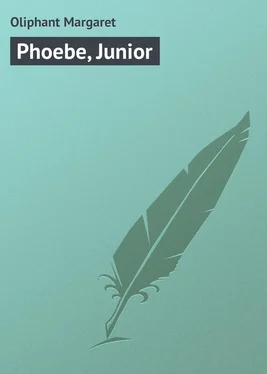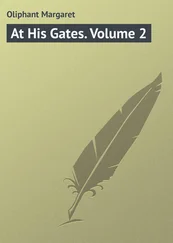Margaret Oliphant - Phoebe, Junior
Здесь есть возможность читать онлайн «Margaret Oliphant - Phoebe, Junior» — ознакомительный отрывок электронной книги совершенно бесплатно, а после прочтения отрывка купить полную версию. В некоторых случаях можно слушать аудио, скачать через торрент в формате fb2 и присутствует краткое содержание. Жанр: foreign_prose, на английском языке. Описание произведения, (предисловие) а так же отзывы посетителей доступны на портале библиотеки ЛибКат.
- Название:Phoebe, Junior
- Автор:
- Жанр:
- Год:неизвестен
- ISBN:нет данных
- Рейтинг книги:3 / 5. Голосов: 1
-
Избранное:Добавить в избранное
- Отзывы:
-
Ваша оценка:
- 60
- 1
- 2
- 3
- 4
- 5
Phoebe, Junior: краткое содержание, описание и аннотация
Предлагаем к чтению аннотацию, описание, краткое содержание или предисловие (зависит от того, что написал сам автор книги «Phoebe, Junior»). Если вы не нашли необходимую информацию о книге — напишите в комментариях, мы постараемся отыскать её.
Phoebe, Junior — читать онлайн ознакомительный отрывок
Ниже представлен текст книги, разбитый по страницам. Система сохранения места последней прочитанной страницы, позволяет с удобством читать онлайн бесплатно книгу «Phoebe, Junior», без необходимости каждый раз заново искать на чём Вы остановились. Поставьте закладку, и сможете в любой момент перейти на страницу, на которой закончили чтение.
Интервал:
Закладка:
As she took the matter in this serious way, it will be understood that the question of dress was not a mere frivolity with her. A week before the ball she stood in front of the large glass in her mother's room, contemplating herself, not with that satisfaction which it is generally supposed a pretty young woman has in contemplating her own image. She was decidedly a pretty young woman. She had a great deal of the hair of the period, nature in her case, as (curiously, yet very truly) in so many others, having lent herself to the prevailing fashion. How it comes about I cannot tell, but it is certain that there does exist at this present moment, a proportion of golden-haired girls which very much exceeds the number we used to see when golden hair had not become fashionable – a freak of nature which is altogether independent of dyes and auriferous fluid, and which probably has influenced fashion unawares. To be sure the pomades of twenty years ago are, Heaven be praised! unknown to this generation, and washing also has become the fashion, which accounts for something. Anyhow, Phœbe, junior, possessed in perfection the hair of the period. She had, too, the complexion which goes naturally with those sunny locks – a warm pink and white, which, had the boundaries between the pink and the white been a little more distinct, would have approached perfection too. This was what she was thinking when she looked at herself in her mother's great glass. Mrs. Beecham stood behind her, more full-blown and more highly-coloured than she, but very evidently the rose to which this bud would come in time. Phœbe looked at her own reflection, and then at her mother's, and sighed such a profound sigh as only lungs in the most excellent condition could produce.
“Mamma,” she said, with an accent of despair, “I am too pink, a great deal too pink! What am I to do?”
“Nonsense, my pet,” said Mrs. Beecham; “you have a lovely complexion;” and she threw a quantity of green ribbons which lay by over her child's hair and shoulders. A cloud crossed the blooming countenance of Phœbe, junior. She disembarrassed herself of the ribbons with another sigh.
“Dear mamma,” she said, “I wish you would let me read with you now and then, about the theory of colours, for instance. Green is the complementary of red. If you want to bring out my pink and make it more conspicuous than ever, of course you will put me in a green dress. No, mamma, dear, not that – I should look a fright; and though I dare say it does not matter much, I object to looking a fright. Women are, I suppose, more ornamental than men, or, at least, everybody says so; and in that case it is our duty to keep it up.”
“You are a funny girl, with your theories of colour,” said Mrs. Beecham. “In my time, fair girls wore greens and blues, and dark girls wore reds and yellows. It was quite simple. Have a white tarlatan, then; every girl looks well in that.”
“You don't see, mamma,” said Phœbe, softly, suppressing in the most admirable manner the delicate trouble of not being understood, “that a thing every girl looks well in, is just the sort of thing that no one looks very well in. White shows no invention. It is as if one took no trouble about one's dress.”
“And neither one ought, Phœbe,” said her mother. “That is very true. It is sinful to waste time thinking of colours and ribbons, when we might be occupied about much more important matters.”
“That is not my opinion at all,” said Phœbe. “I should like people to think I had taken a great deal of trouble. Think of all the trouble that has to be taken to get up this ball!”
“I fear so, indeed; and a great deal of expense,” said Mrs. Beecham, shaking her head. “Yes, when one comes to think of that. But then, you see, wealth has its duties. I don't defend Mr. Copperhead – ”
“I don't think he wants to be defended, mamma. I think it is all nonsense about wasting time. What I incline to, if you won't be shocked, is black.”
“Black!” The suggestion took away Mrs. Beecham's breath. “As if you were fifty! Why, I don't consider myself old enough for black.”
“It is a pity,” said Phœbe, with a glance at her mother's full colours; but that was really of so much less importance. “Black would throw me up,” she added seriously, turning to the glass. “It would take off this pink look. I don't mind it in the cheeks, but I am pink all over; my white is pink. Black would be a great deal the best for both of us. It would tone us down,” said Phœbe, decisively, “and it would throw us up.”
“But for you, a girl under twenty, my dear – ”
“Mamma, what does it matter? The question is, am I to look my best? which I think is my duty to you and to Providence; or am I just,” said Phœbe, with indignation, “to look a little insipidity – a creature with no character – a little girl like everybody else?”
The consequence of this solemn appeal was that both the Phœbes went to Mr. Copperhead's ball in black; the elder in velvet, with Honiton lace (point, which Phœbe, with her artistic instincts, would have much preferred, being unattainable); the younger in tulle, flounced to distraction, and largely relieved with blue. And the consequence of this toilette, and of the fact that Phœbe did her duty by her parents and by Providence, and looked her very best, was that Clarence Copperhead fell a hopeless victim to her fascinations, and scarcely could be induced to leave her side all night. The ball was about as remarkable a ball as could have been seen in London. The son of the house had contemplated with absolute despair the list of invitations. He had deprecated the entertainment altogether. He had said, “We know nobody,” with a despairing impertinence which called forth one of his father's roars of laughter. And though Mr. Copperhead had done all he could to assume the position of that typical Paterfamilias who is condemned to pay for those pleasures of his family which are no pleasure to him, yet common-sense was too much for him, and everybody felt that he was in reality the giver and enjoyer of the entertainment. It was Mr., not Mrs. Copperhead's ball. It was the first of the kind which had ever taken place in his house; the beginning of a new chapter in his social existence. Up to this moment he had not shown any signs of being smitten with that craze for “Society,” which so often and so sorely affects the millionnaire. He had contented himself hitherto with heavy and showy dinners, costing Heaven knows how much a head (Mr. Copperhead knew, and swelled visibly in pride and pleasure as the cost increased), which he consumed in company with twenty people or so of kindred tastes to himself, who appreciated the cost and understood his feelings. On such people, however, his Dresden china was thrown away. Joe and Mrs. Joe were much more in their way than the elegant University man and the well-bred mother, who was “a poor little dowdy,” they all said. Therefore the fact had been forced upon Mr. Copperhead that his circle must be widened and advanced, if his crowning glories were to be appreciated as they deserved.
The hunger of wealth for that something above wealth which the bewildered rich man only discovers the existence of when he has struggled to the highest pinnacle of advancement in his own way, began to seize this wealthy neophyte. To be sure, in this first essay, the company which he assembled in his fine rooms in Portland Place, to see all his fine things and celebrate his glory, was not a fine company, but they afforded more gratification to Mr. Copperhead than if they had been ever so fine. They were people of his own class, his old friends, invited to be dazzled, though standing out to the utmost of their power, and refusing, so far as in them lay, to admit how much dazzled they were. It was a more reasonable sort of vanity than the commoner kind, which aims at displaying its riches to great personages, people who are not dazzled by any extent of grandeur, and in whose bosoms no jealousy is excited towards the giver of the feast. Mr. Copperhead's friends had much more lively feelings; they walked about through the great rooms, with their wives on their arms, in a state of semi-defiance, expressing no admiration, saying to each other, “This must have cost Copperhead a pretty penny,” as they met in doorways; while the ladies put their flowery and jewelled heads together and whispered, “Did you ever see such extravagance? And what a dowdy she is with it all!” This was the under-current of sentiment which flowed strong in all the passages, and down the rapids of the great staircase; a stream of vigorous human feeling, the existence of which was as deeply gratifying to the entertainer as the sweetest flattery. The lord and the ladies who might have been tempted to his great house would not have had a thought to spare for Mr. Copperhead; but the unwilling applause of his own class afforded him a true triumph.
Читать дальшеИнтервал:
Закладка:
Похожие книги на «Phoebe, Junior»
Представляем Вашему вниманию похожие книги на «Phoebe, Junior» списком для выбора. Мы отобрали схожую по названию и смыслу литературу в надежде предоставить читателям больше вариантов отыскать новые, интересные, ещё непрочитанные произведения.
Обсуждение, отзывы о книге «Phoebe, Junior» и просто собственные мнения читателей. Оставьте ваши комментарии, напишите, что Вы думаете о произведении, его смысле или главных героях. Укажите что конкретно понравилось, а что нет, и почему Вы так считаете.












